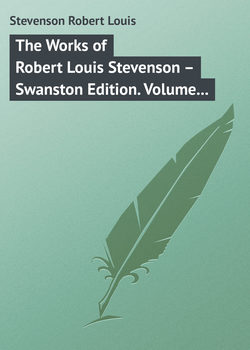The Works of Robert Louis Stevenson – Swanston Edition. Volume 3

Реклама. ООО «ЛитРес», ИНН: 7719571260.
Оглавление
Robert Louis Stevenson. The Works of Robert Louis Stevenson – Swanston Edition. Volume 3
FAMILIAR STUDIES OF MEN AND BOOKS
PREFACE BY WAY OF CRITICISM
I. VICTOR HUGO’S ROMANCES
II. SOME ASPECTS OF ROBERT BURNS
III. WALT WHITMAN
IV. HENRY DAVID THOREAU: HIS CHARACTER AND OPINIONS
V. YOSHIDA-TORAJIRO
VI. FRANÇOIS VILLON, STUDENT, POET, AND HOUSEBREAKER
VII. CHARLES OF ORLEANS
VIII. SAMUEL PEPYS
IX. JOHN KNOX AND HIS RELATIONS TO WOMEN
THE BODY-SNATCHER
Отрывок из книги
These studies are collected from the monthly press. One appeared in the New Quarterly, one in Macmillan’s, and the rest in the Cornhill Magazine. To the Cornhill I owe a double debt of thanks; first, that I was received there in the very best society, and under the eye of the very best of editors; and second, that the proprietors have allowed me to republish so considerable an amount of copy.
These nine worthies have been brought together from many different ages and countries. Not the most erudite of men could be perfectly prepared to deal with so many and such various sides of human life and manners. To pass a true judgment upon Knox and Burns implies a grasp upon the very deepest strain of thought in Scotland, – a country far more essentially different from England than many parts of America; for, in a sense, the first of these men re-created Scotland, and the second is its most essentially national production. To treat fitly of Hugo and Villon would involve yet wider knowledge, not only of a country foreign to the author by race, history, and religion, but of the growth and liberties of art. Of the two Americans, Whitman and Thoreau, each is the type of something not so much realised as widely sought after among the late generations of their countrymen; and to see them clearly in a nice relation to the society that brought them forth, an author would require a large habit of life among modern Americans. As for Yoshida, I have already disclaimed responsibility; it was but my hand that held the pen.
.....
VILLON. I am tempted to regret that I ever wrote on this subject, not merely because the paper strikes me as too picturesque by half, but because I regarded Villon as a bad fellow. Others still think well of him, and can find beautiful and human traits where I saw nothing but artistic evil; and by the principle of the art, those should have written of the man, and not I. Where you see no good, silence is the best. Though this penitence comes too late, it may be well, at least, to give it expression.
The spirit of Villon is still living in the literature of France. Fat Peg is oddly of a piece with the work of Zola, the Goncourts, and the infinitely greater Flaubert; and, while similar in ugliness, still surpasses them in a native power. The old author, breaking with an éclat de voix out of his tongue-tied century, has not yet been touched on his own ground, and still gives us the most vivid and shocking impression of reality. Even if that were not worth doing at all, it would be worth doing as well as he has done it; for the pleasure we take in the author’s skill repays us, or at least reconciles us to the baseness of his attitude. Fat Peg (La Grosse Margot) is typical of much; it is a piece of experience that has nowhere else been rendered into literature; and a kind of gratitude for the author’s plainness mingles, as we read, with the nausea proper to the business. I shall quote here a verse of an old student’s song; worth laying side by side with Villon’s startling ballade. This singer, also, had an unworthy mistress, but he did not choose to share the wages of dishonour; and it is thus, with both wit and pathos, that he laments her fall: —
.....